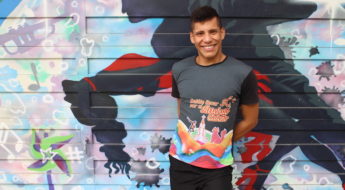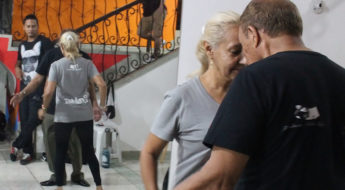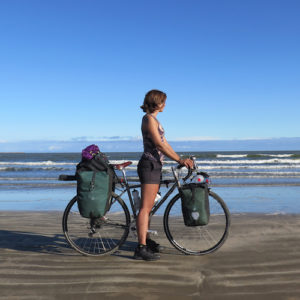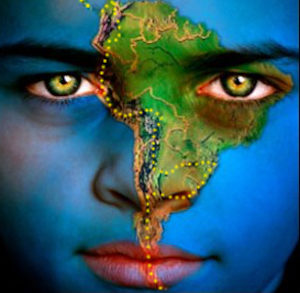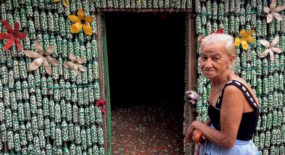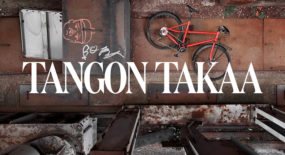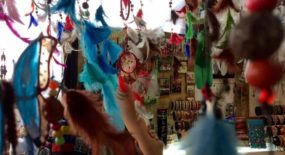MARCELINO! PROFESSIONAL JUGGLER AT STREET LIGHTS IN ECUADOR
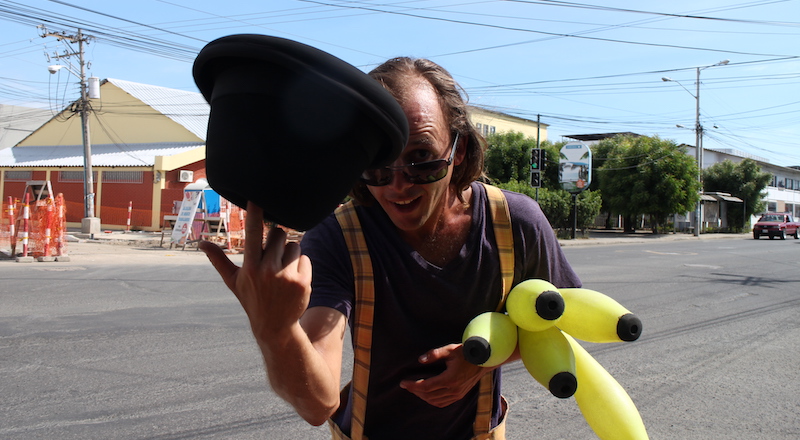
Marcel Jaworski (31) is a Polish-Venezuelan cinematographer, photographer and Marcelino – a professional juggler. I travelled with Marcel on the coast of Ecuador for one week and whilst at it, learned the fundamentals of his profession as a street light juggler. On top of observing his vivid and short performances on the streets, I interviewed him on what is needed for earning a living on the streets.
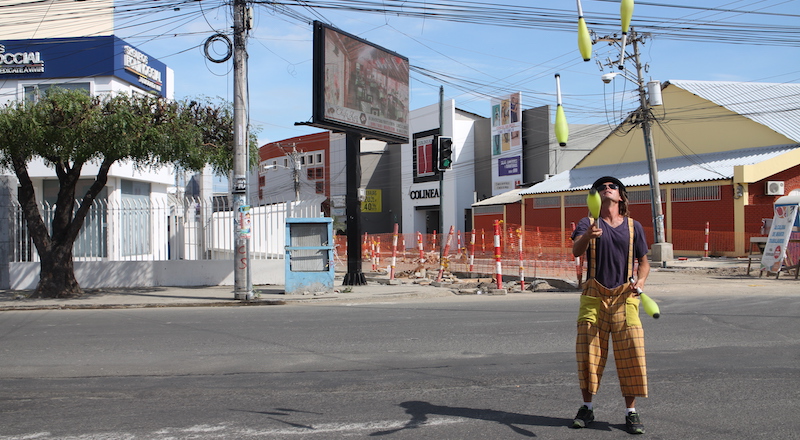
Marcel, you’ve been juggling for over 16 years now. How did it all start?
It all started when I was 15, after sawing a friend of mine juggling. I thought it was an interesting and intriguing ability, so I soon made myself a group of juggling balls out of old tennis socks. After practicing for a time on my own, a friend of mine started visiting me once a week to teach me new tricks. The same friend later took me to a place in my hometown Merida, Venezuela, where people exchanged their juggling skills. This is where the magic really happened. It’s where I learned all the fundamentals of juggling.
When did juggling become your profession?
After learning enough tricks by myself and from other jugglers, I occasionally started showing off my skills at friends’ parties. People saw what I did and step by step started asking me to perform at other parties and events. Since those early times, I’ve been animating parties, performed at circuses and theaters, city squares and now also at street lights.
How do you train?
Right now, juggling at street lights is my training. There, I do the same routine over and over again, from 2 to 12 hours a day. That’s all the training I need for polishing my skills.
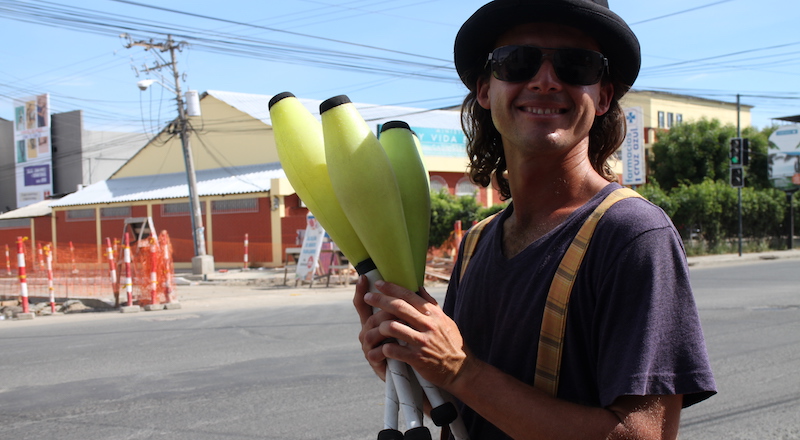
What got you into juggling at street lights?
The first time I ever tried it out was after a juggling exchange workshop. Me and my friends wanted to buy ice cream and were short of cash. So, we decided to juggle at streets lights for a while to earn our ice creams. Surprisingly enough, it worked out. After that, I didn’t used to juggle at street lights back home, but after moving to Quito, I got back to it again out of necessity. I need to earn a living somehow and jugglers call streetlights a certain cash machine, because it’s an easy way to earn money.
Juggling is not very respected in Latin America. Why do you think that is?
Because 30 years ago, when people started performing at street lights, street lights started attracting all kinds of people. Hippies, punks, whatever. People who were not artists, but basically bums who needed money. Therefore, nowadays, all jugglers are seen as bums, even the ones who are professional circus artists. But I still love juggling, no matter how it’s seen.
What is it you love about your job?
I make people happy. Seeing their smiles and laughs also makes myself happy. However, street lights are not the best possible place for juggling. City squares or theaters are definitely more appropriate. As I’m also a cinematographer and photographer, I don’t plan to juggle at street lights all my life. For now, my goal is to earn 1500USD for buying myself a MacBook for editing. Then, let’s see.
A dream you have regarding juggling?
I would love to organize a fair or a theater play with my son. He’s now five and very eager to learn juggling. Some day I hope we can juggle together for an audience.
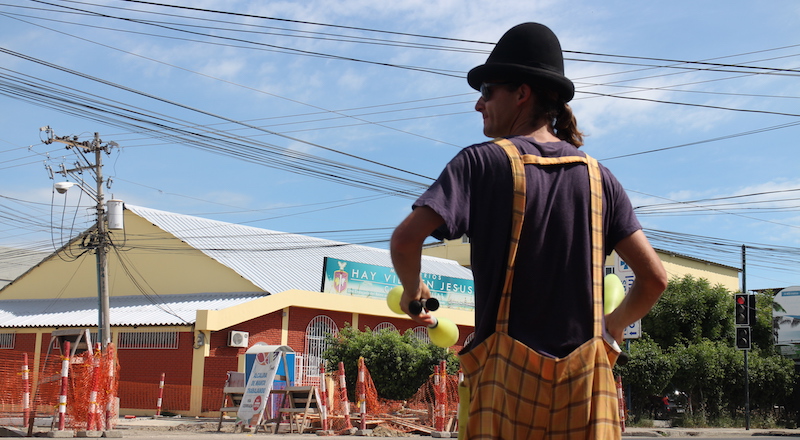
Tips for a wannabe street light juggler
1. Smile. Always!
Smile is very important at street lights. People sit in their cars, dead tired after a day of work. You can really make a difference with a smile.
2. Take care of yourself physically
Your body is your work. If your body is not well, you can’t work. So, you need to take care of your physical well-being.
3. Be creative
There are many jugglers out there. What makes you stand out are your skills and your creativity.
4. Be on the lookout for families
Families are a juggler’s friend. Kids love jugglers and most parents are happy when their kids are happy. Therefore, be on the lookout for cars with children inside.
5. Watch out for vendors
If there are many water/fruit vendors at a crossing, it’s not a good place for juggling. People get overwhelmed when there are two many people asking for money (I have no idea where the vendor in the video below suddenly came from!).
6. The longer the lights, the better
The longer the red lights last, the longer your performance can be, and thus, the better. For example, in Manta, Ecuador, the street lights are crazy short! You have to show your skills in 30 seconds.
7. Don’t juggle against the light
Choose the street lights so, that you won’t have the sun behind you. People in their cars won’t see you if you’re juggling against bright sunlight.
8. Choose a time and place that pay well
In many places, the payment varies a lot from weekdays to weekends, and from hour to hour. For example, in the valleys near Quito, Ecuador, the best times at the lights are when people go to work or return from work. Many times, the first three cars will already tell you the average that people will pay.
9. Protect your eyes and head
When standing under the sun for many hours in a row, you need to wear a hat and sunglasses. Otherwise, you’ll get a serious sunburn by the end of the day.
10. Keep yourself clean
Imagine you’re doing a show where people don’t pay any entrance, but they might pay their exit. Therefore, look professional!
How I met Marcel?
Quite randomly, actually. I was at a salsa club in Quito with a friend of mine, and during the evening, we were joined by her two Venezuelan friends. One of them was Marcel. We talked for a few minutes during the evening and it turned out he had previously done a long cycling trip in Europe, and was just about to leave for some cycling to the coast the following day. I, on the other hand, was about to leave to the rainforest two days later, but we figured maybe we could cycle some stretch together at some point. So, a couple of weeks later, we met up in Guayaquil and cycled along the coast from Salinas to Manta, from where Marcel headed to meet up with his son and I headed to meet up with my next travel companion (luxury after cycling for more than a year alone!)


